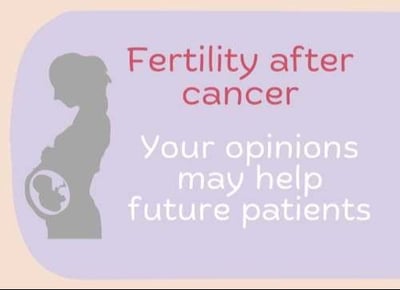Surveys, Registries, Interviews
Online anonymous survey for adults treated in the US for cancer
Study Contact Information:
Questions about the study can be directed to Alejandra Bernal at aab287@pitt.edu.
Exploring Awareness of Fertility Preservation Options in Patients at Risk of Iatrogenic Infertility. Role of Genetic Counselors
About the Study
The purpose of this study is to explore patients' awareness of how medical treatments may affect fertility and identify helpful resources for future patients through a 10-15 minutes anonymous online survey. Enrollment ends on February 28,2025. Adults treated in the US for cancer, thalassemia, or sickle cell disease are eligible to participate.
What the Study Involves
The anonymous survey takes 10-15 minutes to complete. The survey is available in both English and Spanish. No identifying or tracking information will be collected.
The first page introduces the survey, the survey is multiple choice and providing demographic data is optional (for example: sex, age, state, etc.). At the end of the survey, you will have the opportunity to share additional comments if you wish. Participants can withdraw at any time by simply closing their web browser.
While there is no direct compensation for participation, the information gathered will contribute significantly to enhancing patient care and support.
If you would like to participate, please follow the link:
- English: https://pitt.co1.qualtrics.com/jfe/form/SV_0ePmCVqJ6DJviWG
- Español: https://pitt.co1.qualtrics.com/jfe/form/SV_bwt5oJWZr0kU5aS
Lead Researchers/Study PIs and Affiliation
Alejandra Bernal
Contact: aab287@pitt.edu Phone: 773-405-1109
Second-Year Student, Master of Science in Genetic Counseling
School of Public Health. University of Pittsburgh
- Adults treated in the US for cancer, thalassemia, or sickle cell disease.
- Individuals who are younger than 18 years old.
- Patients that received treatment for cancer outside the United States.
